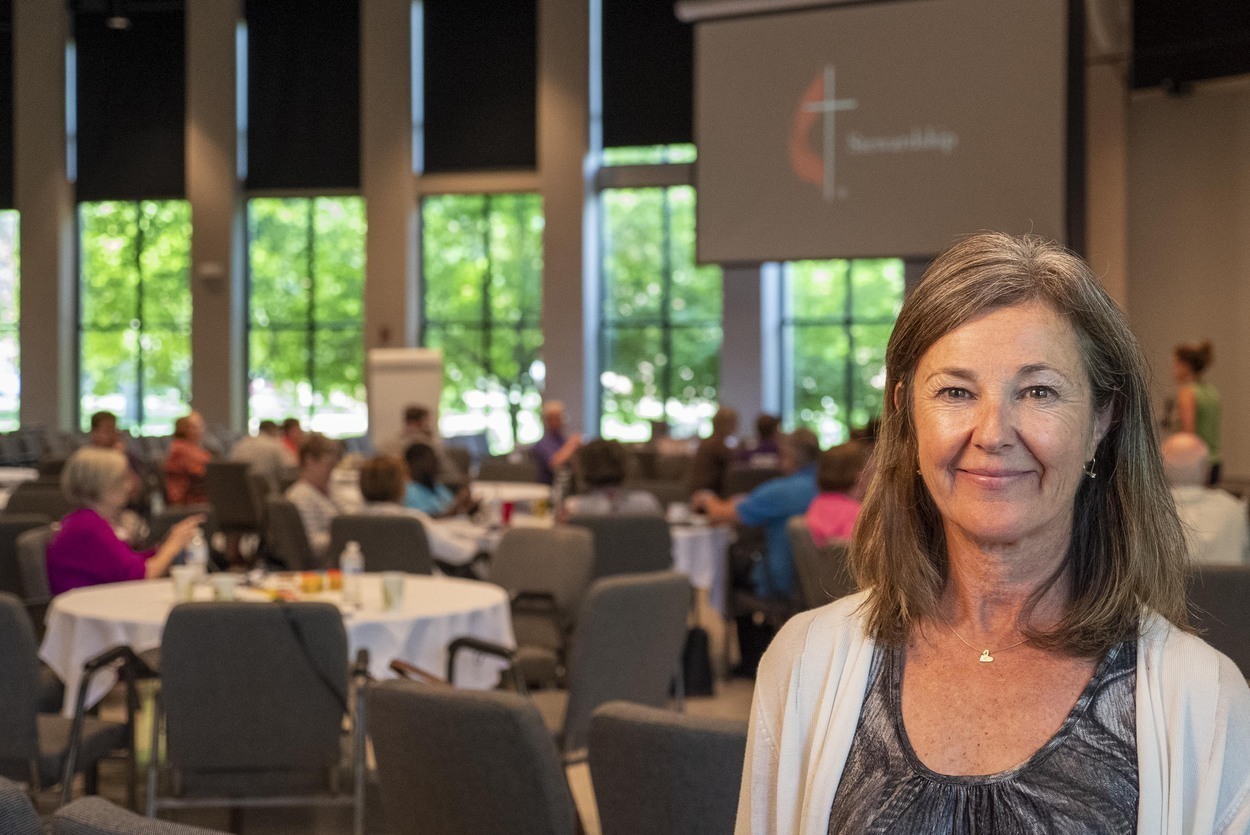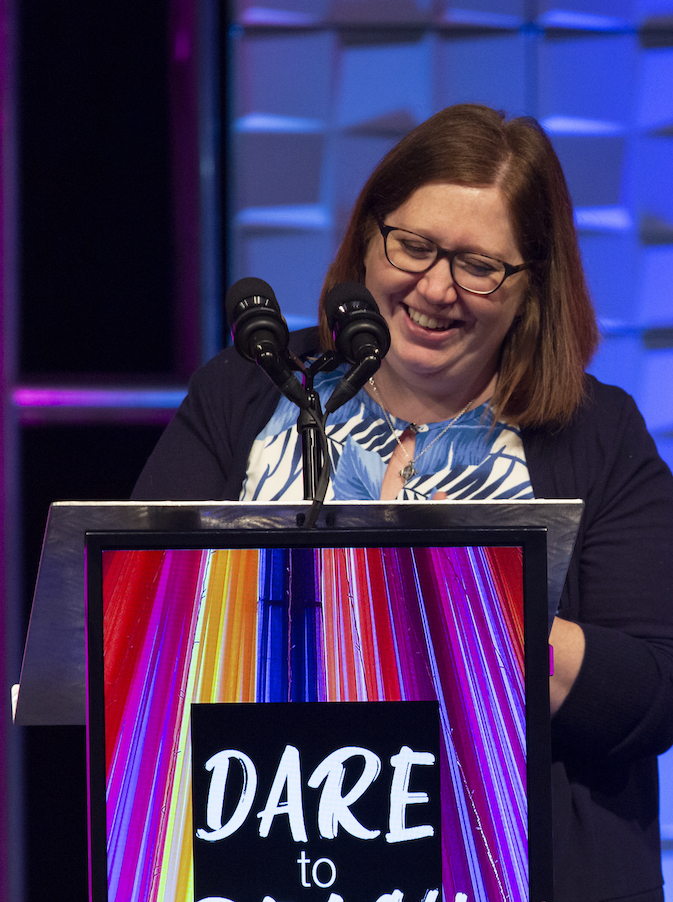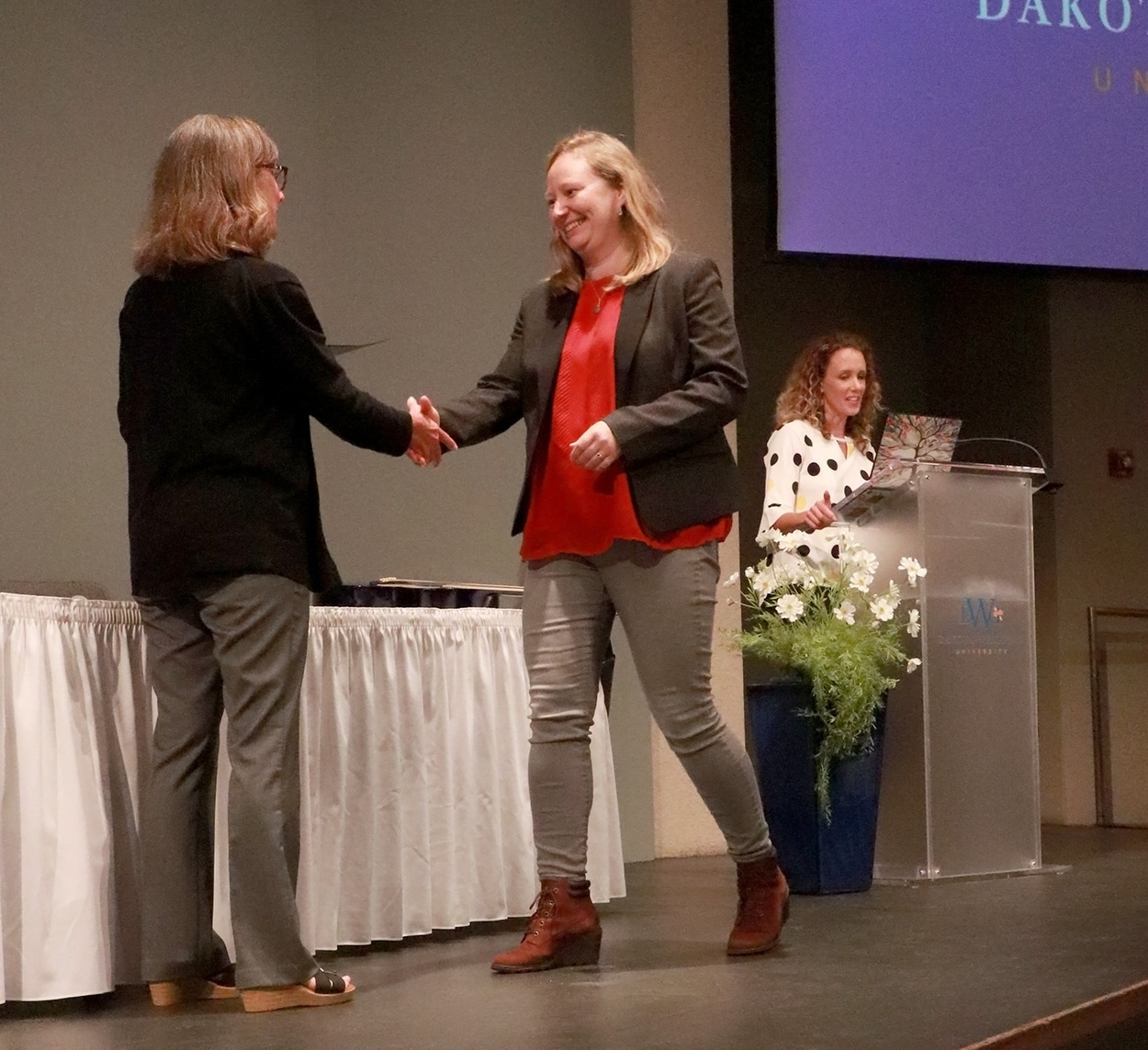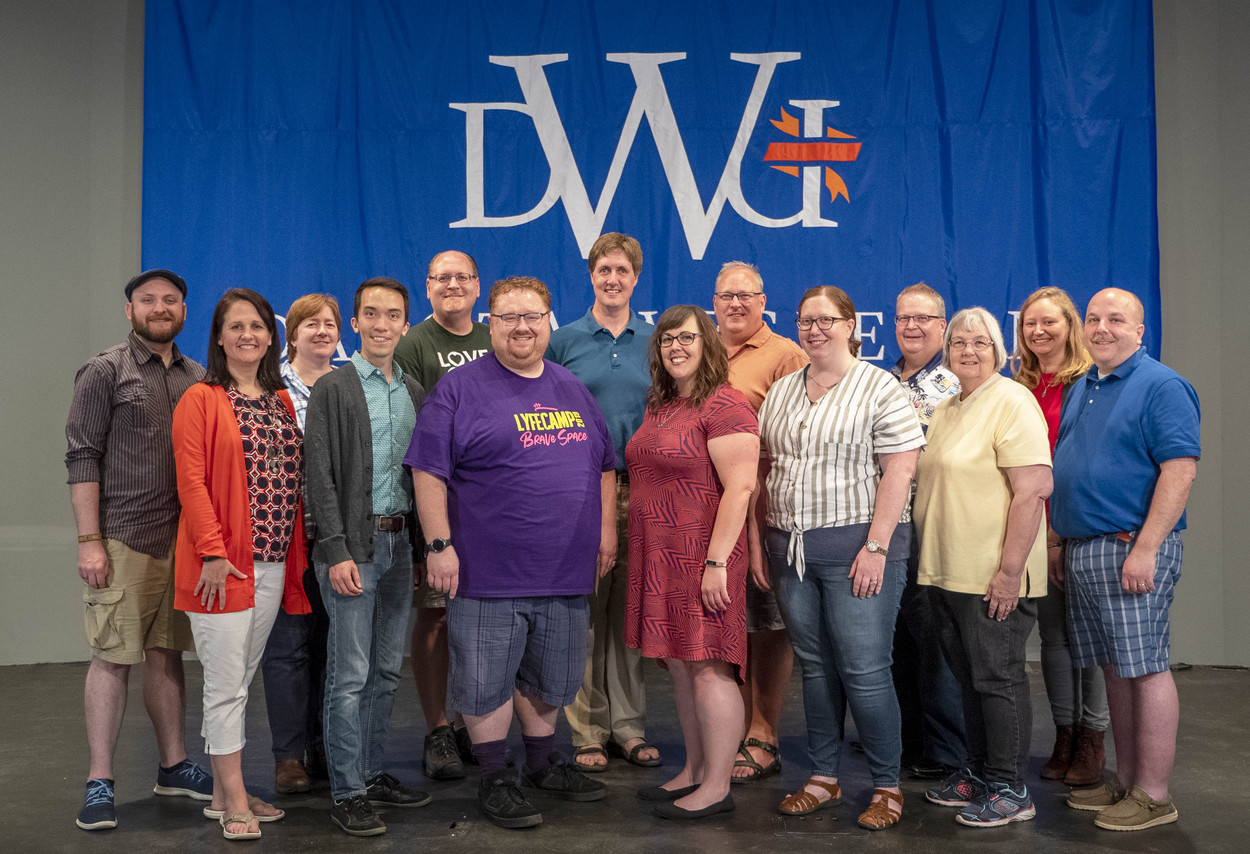
NPCL program creating impact and growth
MITCHELL, South Dakota —The second cohort group of the Non-Profit Church Leadership Program, launched at Dakota Wesleyan University on July 16. The program is for clergy across the Dakotas and the Minnesota Conferences, who are seeking to build upon their business skills and apply their new found knowledge to their local churches. Simultaneously, it was a day of celebration as the pilot cohort group earned their certificates and graduated from the one-year program. Completion of the program earns each pastor a graduate certificate in Non-Profit Church Leadership. This time of celebration and new beginnings is the result of a collaboration between Dakota Wesleyan, the Dakotas and Minnesota Conferences, and the Lilly Grant Foundation that has been years in the making.

Diane Owen, Director of the Dakotas-Minnesota Area Lilly Grant. Photo by David Stucke, Dakotas Conference Communications.
Diane Owen, director for the Dakotas-Minnesota Area Lilly Grant, offered more details. "We began this collaboration about 18 months ago and launched our first cohort in July of 2018. The program is designed for our clergy, especially those who have the potential or interest in leading more complex church systems, larger church systems but are not limited to those. We have had pastors with smaller church systems involved and have benefited tremendously."
The focus is on stewardship of financial resources, human resources, vision, strategy, community, and communications. The year-long program strengthens the competencies that pastors need to lead today's church but did not perhaps obtain during their undergraduate, graduate, or seminary education.
There are four main courses and two applied projects. The applied projects focus on an area within their local church that needs addressing. It could include developing a vision for their local church, financial policies and procedures, governance structure; it depends on the needs of their particular church. View a list of applied projects here. The program is all online with live lectures, readings, assignments, and online chatting with their cohort, instructors, and colleagues.
Local churches are experiencing the impact of the applied projects of the first cohort participants. Ryan Mutzenberger, who serves First UMC in Fargo, North Dakota, completed an applied project related to stewardship. He reports that the project and his experiences with NPCL are having an impact. "This program provided key learning opportunities and the motivation to focus on two important areas of our church; stewardship and mission. Through the classroom learnings and mentoring, we were able to begin creating a culture of stewardship last fall that saw our giving increase by 20%. As a church, we've become better at how to say thank you and show our gratitude to God and to those who share their blessings with the ministries of the church."

Rev. Katie Ricke preached the morning sermon on Friday, June 7, 2019, at the Dakotas Annual Conference in Bismarck, ND. Photo by Joni Rasmussen, jlynnstudios.com.
Rev. Katie Ricke, who serves Zion UMC in Beresford, South Dakota, stated her first applied project was to create a year-round stewardship program within the church. "Our finance team had been meeting once a year to set and approve the budget. Now they meet monthly and have been working on a missional budget, launched e-giving, increased communication with the congregation on financial matters, and have more input in stewardship. They are also dreaming of what more we can do to create disciples through generosity, "she says.
Ricke's second applied project was to create a visioning team within the church and establish a "Discipleship Journey." She says, "We met for about nine months and created a program with assessments for our church to take to help them grow in their discipleship. We are sending out the initial letters this week and the official kick-off on September 8. I am very excited to see how this goes!"
The cohort meets three times a year for orientation, sharing applied projects, and connecting. The first meeting happens in the summer for orientation. In January, they gather to present their first applied project and then meet a third time to present their second project and formally receive their certificate of graduation.
What's unique about this program is that each participant is partnered with a coach. So during their 12-month experience, they're working with a coach to help them through their applied project process or any other issues that may unfold through the experience. One of the most valued experiences of the first cohort is learning about each other, getting to know their colleagues, recognizing that they are full of valuable resource information and learning. "So while they might be taught by an instructor the content and material, the tremendous benefit of learning together has also been recognized," Owen says.
For Rev. Nate Melcher, a senior pastor for Richfield United Methodist Church in the Twin Cities, shares that there were many reasons why the NPCL Program was something he wanted to do. "I'm a big believer in using entrepreneurial and non-profit business tactics if it's going to get the job done. A lot of what the church does and what the non-profit sector does, do merge! I'm a big believer in starting with your WHY, so having our WHY be such a focus of what we're doing here has been just reaffirming that that's a very important piece about why we are the church and what we will do with it. I wanted to try leading a stewardship campaign, and I wanted to look at human resource management more because now I'm a senior pastor at a church where I need to do those things as part of my primary responsibilities."

Rev. Sara McManus receives her certificate from Diane Owen after completion of the Nonprofit Church Leadership program. Also pictured is Associate Professor Alisha Vincent, DWU, one of the creators of the NPCL program. Photo by Ariana Arampatzis, DWU Communications.
Rev. Sara McManus, pastor of West Fargo Flame of Faith UMC in North Dakota, is feeling excited about everything she's learned throughout the course of the program as well. "One of the things I learned the most was organization theory and project management and figuring out how to go after a problem systematically rather than just dealing with things as they come. Setting up the systems and policies, even in a small church, can help see the problem before it happens. I have a lot more confidence in pretty much all of the areas. Maybe it's just knowing the right tools, or even the name of the tools, or an area I had no idea it was even something I was missing. I now know a lot more about it and have the confidence to lead."
Owen is part of a team of highly effective leaders both from Dakota Wesleyan University and The United Methodist Church including Dr. Alisha Vincent and the university's provost, Dr. Joe Roidt. Vincent serves as both the program director and an instructor along with three other instructors. Aside from them, five coaches work separately with the students. The coaches all come from a business background rather than an experience that has mainly consisted of a church setting, which gives the students interesting perspectives on implementing the skills they are honing back in their respective congregations. These factors and more contribute to the NPCL program's uniqueness and draw to prospective future participants.
"The willingness and desire to experiment and be innovative, I think, is rooted in the culture of Dakota Wesleyan. The fact that the experiment is proving to be largely successful demonstrates the culture that seems to be evident here. The word is getting out that there is something unique and special happening at DWU through this collaboration. It does create a place for expansion and growth beyond our region. We are excited that we tried something new, and it seems to be sticking. One of the very positive things I've heard about this program is that the individual can apply almost immediately some of their learning. They're able to take a new skill or some knowledge and translate that fairly rapidly into the work of their local church. It's not just theoretical knowledge. It is a practical application that gives this a lot of strength," says Owen.
Local churches are growing in vitality as a result of learning and leadership of the NCPL participants. Rev. Jen Tyler, who serves Evergreen UMC, Wahpeton, North Dakota, shares that she has seen growth in numbers at her church from implementing applied projects, tools and resources from the NCPL program. "We have seen growth in attendance and participation," says Tyler. "Our financial pledges were up 28% for 2019 over 2018, for example, and our average attendance for spring Wednesday School (vs. the previous year's Sunday School) was up 500%! We have also seen growth in opportunities for volunteers as a result of intentionally seeking to place volunteers where they are called, vs. serving where our needs arise."
As newly graduated certificate holders in Non-Profit Church Leadership, McManus and Melcher offered some words of advice to the incoming cohort.
"I would say grace abounds and so take that grace and give it to others. I would also say that if you're returning to academia for the first time in a long time one of the changes that may have happened since you were here is that everything is digital. Not only are the classes online, which does have a different kind of sense about your accountability and your responsibility for your learning, but also, all the resources are available to you digitally. I would say take everything that's in the class modules, download it, and keep it somewhere safe so that later on, six months down the road, after the certification, and you're scratching your head, all those results will be right there," says Melcher.
McManus says, "The best advice I would have is use the resources you are given. Whether it's your classmates and colleagues across the two conferences, the coaches or the teachers, or even the expertise you don't know you have in your church. Use it and don't go it alone."
View a list of NPCL participants here.
Take a look at the applied projects here.

The first graduating class of the Nonprofit Church Leadership Certification Program, July 16, 2019. Clergy from the Dakotas and Minnesota Conferences completed the program and were awarded their certificates in a ceremony in the Sherman Center on the campus of Dakota Wesleyan University, Mitchell, SD.